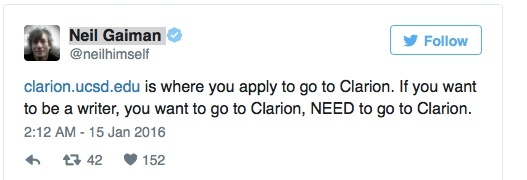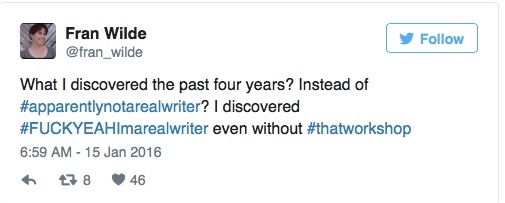Thoughts on Clarion, Privilege and Gaiman
So Neil Gaiman—a writer whose success and public image make him a hero to many aspiring writers—tweeted this:
It got noticed.
Clarion is a workshop for science fiction and fantasy writers, taught by successful established authors in those fields. Its also expensive, long (five to six weeks), and so beyond the reach of a great many aspiring authors. To quote a tweet by author and attendee Kayla Whaley:
Now, I don’t for a moment believe that Gaiman literally meant need, as in you can’t consider yourself a real writer unless you have Clarion on your CV. But at the same time, I understand the outrage of those who see his statement as an unthinking beacon of privilege. Who the hell is Neil Gaiman, who will never again have to worry about paying bills, or child care, or taking time off from work, or any of the day-to-day struggles that most of his readers experience, to tell us what we need? It’s in the same ballpark as Gwyneth Paltrow’s famous statements about her being a “typical” mother.
Like a lot of writers, I never went to Clarion, or any professional writing workshop. I learned to write via journalism, both from studying it and working at it. I like to say it’s one reason my books are so short, but in another very important way, it taught me to approach writing as a job. A reporter is no special snowflake: if he or she can’t do the work, there’s always someone waiting to eagerly step up. So you get on with it, and do the best you can with what you have. That lesson has been incredibly useful as a fiction writer, too.
I did, however, have an interesting chance to observe, from the outside, an MFA creative writing program, thanks to having a girlfriend who was in it. I watched the same group of writers work their way through and all publish their first novels at about the same time. And the biggest thing I noticed was, all those novels were the same. Sure, the backgrounds and styles might be different, but the themes were identical: thinly-disguised autobiography of young misunderstood artists struggling for vindication, dealing with parental issues and, more often than not, finding the kind of love that’s been described as the “manic pixie dream girl (or guy).”
What this taught me was that workshops are a limited kind of help to a writer. A writing teacher can’t really teach you how to write; they can only teach you how they write. Some of their techniques may work for you, some may not. But if you follow their example too closely, you end up writing just like them, and so does everyone else in your class. It’s a lesson I try hard to remember when I teach workshops and classes.
I’ve always held that the best way to learn to write is, simply, to start writing. Writing teachers (whether in schools, writing groups, or workshops like Clarion) can help, to an extent, speed up this process, and certainly the validation is no small thing; having someone you respect tell you they like what you’ve written is a thrill that never gets old. But unless you have it in you to plow through, to learn to spot errors on your own and fix them, you’re probably not cut out for the job.
So again, I’m certain Neil Gaiman didn’t mean his tweet to be taken literally. But someone of his stature should understand the power of his words to those struggling up the ladder after him. Or to quote another tweet, from Fran Wilde:
(You can read the rest of Fran’s tweets on the topic here. They’re worth it.)






